
Table of Contents
-
Introduction – 1
-
Categories of Child Sexual Abuse – 1
-
Child Abuse in the UK – 1
-
Group-Based Child Sexual Exploitation (CSE) – 4
-
White Grooming Gangs and Paedophile Networks – 4
-
Pakistani Grooming Gangs and Public Response – 4
-
Compare and Analyse White and Pakistani Grooming – 5
-
Percentage Convicted Each Year – 6
-
British Whites in Overseas Prisons for CSA – 6
-
Why Pakistanis Are Targeted in the UK – 7
-
Political Response – 8
-
Media Response and Far-Right Exploitation – 9
-
Pakistan as a Brand: Stigma and Consequences – 10
-
Conclusion and Recommendations – 11
-
Reference – 12
- Introduction
Child sexual abuse (CSA) in the United Kingdom is a complex and deeply rooted issue, encompassing online exploitation, familial and contact abuse, transnational offences, and group-based grooming. While data and official reports (Home Office, 2019) confirm that the majority of CSA offenders are white British men, the actions of British Pakistani offenders, particularly in group-based cases, have received disproportionately high levels of media, political, and public attention. This imbalance has sparked significant controversy, raising concerns about racial profiling, the politicisation of child protection, and institutional reluctance to confront abuse more broadly. Critics argue that CSA statistics are often misrepresented or selectively used to support racially charged narratives, undermining justice for victims and damaging social cohesion (Casey Audit, 2025; Solorzano, 2025).
Figure 1: Child Sexual Abuse and Grooming Gangs in
the UK
Source: https://c.files.bbci.co.uk/13172/
production
/_111249187_composite_op_
bullfinchfinal.jpg
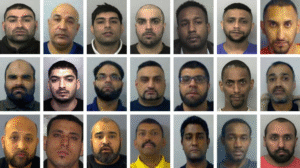
- Categories of Child Sexual Abuse
The UK’s Child Exploitation and Online Protection Command (CEOP) outlines four primary threats related to child sexual abuse (CSA):
- Indecent imagery – the creation and live streaming of abusive content.
- Online exploitation – including grooming and cyber-abuse through digital platforms.
- Transnational abuse – offences committed abroad by UK nationals.
- Contact abuse – systematic, often group-based, physical exploitation.
These categories frequently overlap. For instance, contact abuse may begin with online grooming, and international travel can facilitate direct abuse of vulnerable children overseas (CEOP, 2019).
-
Child Abuse in the UK
Child sexual abuse (CSA) has long been a troubling issue in British society, cutting across all social classes and institutions. While the media tends to focus on the most shocking or high-profile cases, most of the abuse occurs in silence, typically perpetrated by someone the child knows. According to the NSPCC (2023), approximately 90 per cent of victims are abused by individuals close to them, such as parents, relatives, carers, or trusted members of their community.
Institutional failings have played a significant role in enabling abuse to continue unchecked. Investigations have revealed systemic cover-ups across schools, religious organisations, the military, youth clubs, and the entertainment industry. The exposure of prolific abuser Jimmy Savile after his death led to Operation Yewtree, which uncovered decades of abuse by celebrities who had been shielded by their public status and a culture of silence.
The Independent Inquiry into Child Sexual Abuse (IICSA, 2022) noted that the scale of CSA was alarming, but the repeated failure of safeguarding institutions to respond adequately was equally disturbing.
In May 2014, 83-year-old entertainer Rolf Harris stood trial at Southwark Crown Court on twelve counts of indecent assault involving four girls, aged between eight and nineteen, over a period spanning the late 1960s to the mid-1980s. Despite his claims that some of the encounters were consensual adult relationships, the jury returned guilty verdicts on all charges. On 30 June 2014, Judge Sweeney sentenced Harris to five years and nine months in prison, noting his complete lack of remorse. The convictions brought an end to Harris’s public career and led to the revocation of numerous honours (BBC News, 2023).
-
Group-Based Child Sexual Exploitation (CSE)
Group-based child sexual exploitation (CSE) is one of the most prevalent yet difficult forms of abuse to detect. It typically involves two or more offenders, either operating informally or as part of organised networks, who groom, manipulate, and sexually exploit children. This form of abuse largely targets vulnerable teenagers, with most victims being girls aged between 12 and 18, although boys are also affected (Kavenagh et al., 2023). Many of these young people come from troubled backgrounds, including the care system, low-income households, or environments marked by neglect, instability, or trauma.
The grooming process is often deceptive and calculated. Offenders usually begin by building trust with the child through the provision of gifts, takeaway food, alcohol, drugs, or emotional support. In some instances, an older teenage boy may pose as a boyfriend to foster romantic attachment. Once trust and dependence are established, victims may be coerced, blackmailed, or threatened with violence or humiliation to force them into sexual activity with multiple men. In more severe cases, victims are trafficked across towns or regions and passed between various abuser networks (Home Affairs Committee, 2013).
Despite the seriousness of the issue, the true scale of group based CSE remains largely underreported. While estimates suggest there could be as many as 17,000 such cases across the UK in 2024, only 700 were officially recorded in the Complex and Organised Child Abuse Dataset (COCAD). This significant disparity reflects inconsistencies in police reporting, a lack of training in recognising grooming patterns, and a widespread reluctance among victims to come forward—often due to fear, trauma, or a lack of trust in authorities (Casey Audit, 2025).
These gaps in data hinder efforts to fully understand group based CSE and to implement effective prevention and prosecution strategies. Improving victim identification, ensuring thorough documentation, and providing trauma-informed support are all essential to tackling this enduring issue.
Figure 2: Group-Based Child Sexual Exploitation
Source: https://encrypted-tbn0.gstatic.com
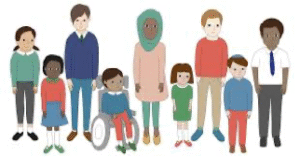
-
British White Grooming Gangs and Paedophile Networks
Child sexual abuse in the UK is predominantly perpetrated by white British men, particularly in cases involving institutions, families, and online exploitation (Ali et al., 2021). White-dominated paedophile networks have operated within respected establishments such as schools, churches, care homes, youth organisations, and even political spheres. Offenders have included teachers, clergy, entertainers, and others in influential positions who exploited their authority to access and abuse children, often shielded by institutional silence for decades.
One of the most well-known investigations into such abuse was Operation Yewtree, launched following the posthumous revelations about Jimmy Savile, a long-time BBC figure exposed as a prolific abuser. The operation led to several high-profile convictions of white British celebrities and highlighted significant institutional failings that had allowed such abuse to persist unchecked (BBC, 2012).
Online, white British men are also disproportionately involved in the creation and dissemination of child sexual abuse material. According to the National Crime Agency (2023), many of these individuals participate in dark web forums, share indecent images, and pay to view live-streamed abuse involving children in developing countries. Historical cases from the 1960s also reveal extreme levels of abuse carried out by white British men.
Despite these patterns, media and political narratives rarely use terms like “white grooming gangs” to describe these offenders. In contrast to the racialised framing often applied to British Pakistani offenders, such cases involving white perpetrators are typically portrayed as isolated incidents, rather than part of a broader cultural or group-based phenomenon.
The Saddleworth Moors Murders
Example: The most known names of child abusers and child murderers are
Myra Hindley and Bradley, Moors Murderers A Notorious Couple and their Young Prey
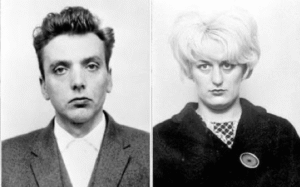
Sadistic child murderers that shocked the nation.
Rolf Harris – A Serial Child Abuser
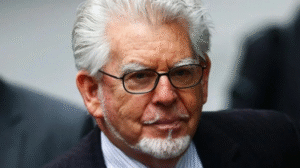
Disgraced former entertainer Rolf Harris who was jailed for series of indecent assaults on girls.
Disgraced Garry Glitter – Podophile
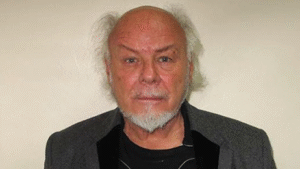
Disgraced podophile Gary Glitter abused girls as little as age 12.
Sir Cyril Smith MP

Serial Child Abuser
Glasgow child sex abuse gang given life sentences
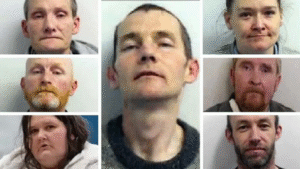
The victims were abused over a seven-year period in Glasgow drug den which became known as “the beastie house”
Six Men from Bolton Area “depraved “Grooming Gang who preyed on young girls
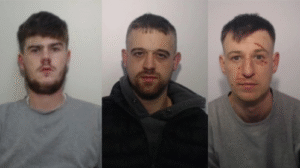
Corey Barret – Richard Haslam – Jack Poulson
These men from Greater Manchester raped and abused their victims, who were between aged 13 – 15, at a property which became known as the party house in Blackrod, Bolton between 2016 and 2018 and were jailed.
Prolific paedophile convicted of abusing several children over three decades
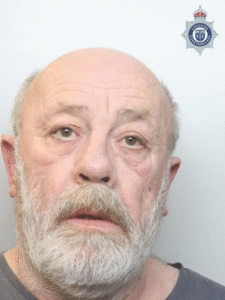
A 67-year-old man has been convicted of abusing children over three decades in one of the biggest child sex abuse cases that the Crown Prosecution Service in Merseyside and Cheshire has ever dealt with. These offences involved the abuse of six boys and two girls, aged between five and 15, at different periods between 1976 and 2006 inclusive. He was charged with 59 counts.
-
British Pakistani Grooming Gangs and Public Response
Over the past two decades, the UK has witnessed a number of widely reported grooming cases involving networks of British Pakistani men in towns and cities such as Rotherham, Rochdale, Huddersfield, Oxford, and Telford. These incidents involved the prolonged and organised sexual exploitation and trafficking of predominantly white, working-class girls—many of whom were in local authority care or came from vulnerable backgrounds. The perpetrators were often employed in night-time industries such as taxi services, takeaway outlets, and shisha bars, which provided access to at-risk individuals (Yasin et al., 2024; IICSA, 2022).
These revelations triggered public outrage and intense political debate. A controversial report by the Quilliam Foundation (2020) claimed that 84 per cent of grooming gang offenders were of South Asian heritage. However, the report faced significant criticism from leading criminologists, including Dr Ella Cockbain and Dr Waqas Tufail, who challenged its small sample size, lack of peer review, and flawed methodology (Cristiano et al., 2023).
In response to growing public concern, the Home Office published a detailed review in 2020. While it acknowledged that some group-based offenders were of South Asian background, it concluded that the majority were likely to be white. Crucially, the review also highlighted serious shortcomings in the way police forces recorded ethnicity data, rendering any definitive conclusions unreliable (Home Office, 2019). Despite this, media and political narratives continue to disproportionately focus on British Pakistani offenders, perpetuating an imbalanced portrayal of the issue.
Figure 3: Public Response
Source: https://encrypted-tbn0.gstatic.com/
dF2i3dpw9NLYDdJ6u2szoz-nfsV4gsv20A&s
-
Compare and Analyse White and Pakistani Grooming
There are clear differences in the patterns of grooming, operational contexts, and public responses to child sexual abuse committed by white British offenders compared to British Pakistani offenders, despite both resulting in equally severe harm to victims.
White-led grooming networks are often embedded within established institutions such as the Catholic Church, independent schools, care homes, youth organisations, and national broadcasters like the BBC (Hamilton and Hamilton, 2024). The perpetrators are typically older men in positions of authority, priests, teachers, youth workers, politicians, or celebrities, who exploit their status and prolonged access to children to carry out abuse, sometimes over many years. Institutional complicity, denial, or deliberate suppression often protects these individuals, and whistle-blowers are frequently ignored or silenced. When these offenders are exposed, they are usually depicted as isolated wrongdoers—”bad apples” whose actions are seen as separate from their community or cultural background (Lee, 2025).
By contrast, British Pakistani grooming gangs tend to emerge in economically disadvantaged urban areas like Rotherham, Rochdale, Telford, or Huddersfield (Alexander, 2024). These are typically loosely connected groups of younger men working in night-time sectors such as taxi services, takeaways, and shisha lounges. Their victims are often vulnerable white girls—frequently in care or facing social difficulties, who are initially groomed with attention, food, alcohol, drugs, and flattery. Over time, the victims are coerced into sexual activity with multiple men. In the most severe cases, this escalates into trafficking across towns and regions, where girls are passed between abusers and subjected to repeated assaults (Cyprien et al., 2025).
Despite the comparable nature and impact of these crimes, media and political narratives treat them very differently. White perpetrators are generally portrayed as lone offenders, with little reference to their racial or cultural identity. In contrast, British Pakistani offenders are often discussed in collective terms, with entire communities subjected to scrutiny, racial stereotyping, and cultural blame. This framing suggests an inherent link between their ethnicity or religion and the abuse, despite the absence of evidence to support such claims (Home Office, 2019; Casey Audit, 2025).
This unequal treatment has serious societal consequences. It fuels moral panic, stokes Islamophobia, and detracts from the broader reality that child sexual abuse is a systemic issue affecting all communities in the UK (Rind, 2023). A fair and effective response requires viewing grooming and abuse as criminal acts committed by individuals, not as cultural or ethnic traits.
-
Percentage Convicted Each Year
Conviction rates for child sexual abuse (CSA) in the United Kingdom remain alarmingly low, reflecting deep-rooted issues within both the criminal justice system and child protection services. According to recent studies, only 2–6 per cent of CSA cases result in successful convictions each year (NSPCC, 2025). This figure does not necessarily reflect a failure to investigate but rather highlights the significant complexity involved in prosecuting such cases.
One of the primary barriers to securing convictions is underreporting. Many victims delay disclosure for years, or never come forward at all, due to fear, shame, trauma, or a lack of trust in authorities. When reports are eventually made, investigations are often hampered by the passage of time, limited physical evidence, or the emotional toll that may lead victims to withdraw their complaints. Legal proceedings also require robust and corroborated evidence, which is particularly difficult to obtain in historical or ongoing abuse cases.
These challenges are even more pronounced in cases involving group-based child sexual exploitation (CSE). According to the Casey National Audit (2025), approximately 17,000 such cases were identified in 2024. However, only about 700 were recorded in the Complex and Organised Child Abuse Dataset (COCAD), representing just 4 per cent of the estimated total. Of those recorded, even fewer progressed to charges or trials, and a small fraction led to convictions.
Additionally, inconsistencies in data collection and police recording practices further complicate the identification and prosecution of offenders. Many local police forces lack the resources or specialised training required to recognise grooming patterns, especially in cases where abuse occurs informally or is dispersed across various locations.
Ultimately, these persistently low conviction rates underscore the urgent need for systemic reform. This includes enhanced victim support services, improved training for investigators, and greater collaboration and data sharing between agencies. Without these changes, countless perpetrators, regardless of their background, will continue to escape justice, and victims will remain without the protection and closure they deserve.
-
British Whites in Overseas Prisons for CSA
Child sexual abuse (CSA) committed by British nationals abroad is an emerging and concerning issue that highlights the global nature of child exploitation. According to reports from the British Foreign Office and the National Crime Agency (NCA), numerous British citizens have been convicted of CSA offences overseas, particularly in countries across Southeast Asia, such as Thailand, Cambodia, and the Philippines, as well as parts of Sub-Saharan Africa (NCA, 2019; ChildSafe, 2022).
Although official data disaggregated by ethnicity is limited, extensive evidence from case studies, non-governmental organisations, and investigative journalism suggests that nearly all those convicted are white British men. Many are repeat offenders who deliberately travel to exploit vulnerable children in regions where poverty, weak legal protections, and inadequate child welfare systems make such abuse easier to perpetrate, a practice widely known as “child sex tourism” (Wefers, 2021).
Some offenders pose as aid workers, teachers, or missionaries, embedding themselves in communities to gain access to children. Others, based in the UK, pay foreign distributors to livestream abuse from cyber cafés or mobile devices. There are also documented cases of British men involved in sharing or producing CSA material recorded abroad.
In response, international child protection organisations such as ECPAT and ChildSafe have urged closer cooperation between the UK and foreign governments. The NCA’s Child Exploitation and Online Protection (CEOP) unit works alongside Interpol and local law enforcement in high-risk regions to track and apprehend offenders. However, efforts are often hindered by jurisdictional limitations, corruption, and inadequate extradition frameworks (Nemets et al., 2024).
This growing pattern of transnational abuse reveals that CSA is not confined to the UK’s borders. White British offenders play a significant role in global child exploitation, though this is rarely acknowledged in mainstream media, especially when compared to domestic group-based grooming narratives.
Figure 4: Overseas Prisons for CSA
Source: https://www.google.
Fwww.irmct.org%2Fsites%2Fdefault%2
-
Why Pakistanis Are Targeted in the UK
Over the past two decades, British Pakistani men have increasingly been portrayed in political and media narratives as the primary face of so-called grooming gangs in the UK. This depiction persists despite findings from the Home Office and independent inquiries which clearly show that most of the child sexual abuse (CSA) offenders are white British men (Home Office, 2019). The disproportionate focus on Pakistani offenders can be attributed to several interconnected factors:
- Racial and religious profiling: Terms such as “Muslim grooming gangs” are frequently used by tabloid media and politicians, creating a misleading association between Islam, Pakistani identity, and sexual abuse. This linkage persists despite the absence of credible evidence connecting either the religion or culture to child exploitation (Elliott, 2021).
- Political opportunism: Far-right groups like Britain First and the English Defence League (EDL) have exploited grooming gang narratives to fuel anti-Muslim sentiment, attract followers, and justify hate crimes. These groups often promote the racist notion that child abuse is inherently a Muslim male issue targeting white girls, reinforcing a divisive “us versus them” ideology (Allchorn, 2024).
Institutional hesitation and political sensitivity: In her landmark report on Rotherham, Professor Alexis Jay (2014) highlighted those authorities failed to act on known abuse cases due to fears of offending influential Pakistani communities in a Labour stronghold. Similarly, journalist Helen Pidd (2015) reported that police and local council officials were reluctant to pursue allegations robustly, concerned about accusations of racism or causing community tensions.
As a result, British Pakistani men have been disproportionately scrutinised, with entire communities subjected to collective blame and increased policing. Experts argue that this racialised framing not only diverts attention from the broader issue of CSA across all communities but also obscures institutional failures and prevents a more inclusive, victim-centred approach to safeguarding (Greer & McLaughlin, 2013).
-
Political Response
In recent years, the ethnicity of offenders involved in grooming gangs and child sexual exploitation (CSE) has become a politically charged topic in the UK, with particular focus placed on British Pakistani men. Prominent political figures have contributed to the controversy through public statements that, according to critics, are divisive, misleading, and lacking in evidence.
In 2011, former Labour Home Secretary Jack Straw stated on BBC Newsnight that some British Pakistani men viewed white girls as “easy meat” and suggested that cultural norms within certain Pakistani communities enabled abuse. His comments were widely condemned for reinforcing racial stereotypes and for oversimplifying a complex issue (BBC, 2018).
Similarly, in 2017, the Labour MP for Rotherham, a town deeply affected by a grooming scandal—claimed in an article for The Sun that the UK had a specific problem with British Pakistani men raping and exploiting white girls. Following intense backlash, she resigned from her role as Shadow Minister for Equalities and later acknowledged the dangers of framing such crimes through the lens of ethnicity rather than individual culpability (Cockbain & Tufail, 2020).
In 2023, then Home Secretary Suella Braverman asserted in a published article that grooming gangs consisted of “almost exclusively” of British Pakistani men, citing so-called cultural incompatibility as a contributing factor. However, the Independent Press Standards Organisation (IPSO) later issued a correction, stating that her claims were misleading and not supported by government data (IPSO, 2024).
In a more extreme case, US Supreme Court Justice Tom Parker claimed in 2015 that graphic, group based CSE represented “the most racially based crime ever perpetrated in modern-day Britain,” a statement widely criticised for its inflammatory nature and lack of nuance (La Cena, 2022).
Such political rhetoric often ignores broader statistical evidence indicating that most CSA perpetrators in the UK are white. These narratives have been accused of fuelling racial tensions, overshadowing institutional failings, and undermining efforts to develop policies that prioritise the welfare of victims over identity-based generalisations.
Figure 5: Political Response Source: https://
www.google.com/imgres?q=
Political%20Response%20child%20ab
use&imgurl=
https%3A%2F%2Fenglish.seoul.go.kr%2F
wp-content
%2Fuploads%2F
2021%2F05%2Fchild-abuse.png&im
refurl=ht
ps%3A%2F%2Fenglish.seoul.go.kr%
2Fsmg-smpa-announc
-
Media Response and Far-Right Exploitation
The British media has played a significant role in shaping public perceptions of grooming gangs, often framing the issue through a racial and religious lens. High-profile cases involving British Pakistani men have frequently been described using terms like “Muslim grooming gangs” or “Asian sex abuse rings,” even when there is no clear link between the offences and the individuals’ religion or culture. This approach has been widely criticised by academics and community leaders for being misleading, inflammatory, and for perpetuating harmful stereotypes (Beeghly, 2025).
Leading scholars, including Dr Ella Cockbain (2018), Dr Aisha K. Gill, Karen Harrison (2018), and Vasil Karastanchev (2019), have described this media portrayal as a form of moral panic, a collective overreaction driven by sensationalist coverage and politicised discourse. Their research suggests that the focus on grooming gangs has evolved into a narrative of racial and religious vulnerability, while similar crimes committed by white offenders are reported with less collective emphasis and more attention to individual circumstances.
Far-right groups such as Britain First, the English Defence League (EDL), and Patriotic Alternative have capitalised on this racialised framing. Cases involving South Asian men have been used by these organisations to stir anti-Muslim sentiment, organise protests, and recruit followers. In doing so, they foster xenophobia and contribute to a hostile environment for British Pakistani communities, who are overwhelmingly law-abiding and equally appalled by such crimes.
Organisations like the NSPCC (2025) have expressed concern over the media’s disproportionate emphasis on Pakistani offenders in CSA coverage. They warn that this selective focus detracts from the broader issue of child sexual abuse, including familial, institutional, and online abuse, which involves offenders from a wide range of ethnic backgrounds.
When media outlets, and the far-right groups that echo them racialize the narrative around CSA, they risk undermining community cohesion, distorting public understanding, and weakening prevention efforts and victim support services at every level.
Figure 6: Far-Right Exploitation
Source: https://www.google.com/imgres?q=
20and%20Far-Right%20Exploitatio
Fsites%2Fdefault%2Ffiles%2Fstyles%2
-
Pakistan as a Brand: Stigma and Consequences
The longstanding association made in media and political discourse between child sexual abuse, particularly grooming gang cases, and individuals of Pakistani heritage has had profound social and psychological consequences for the British Pakistani community. This racialised narrative not only reinforces harmful stereotypes based on the actions of a small number of offenders, but also cultivates the misguided perception that criminality is somehow inherent to Pakistani or Muslim identity (Sufi & Yasmin, 2022).
Community leaders, campaigners, and scholars have repeatedly warned that such framing damages both the image of Pakistan as a nation and the wider British Pakistani diaspora. Organisations like the British Pakistan Foundation (2024) have reported that law-abiding Pakistani families, completely unconnected to any form of abuse, are frequently subjected to suspicion, Islamophobic attitudes, and social stigma purely on the basis of their ethnicity.
British Pakistani children, in particular, face bullying and stereotyping in schools and public settings. Innocent individuals have reported being racially profiled, interrogated about their religious beliefs, and excluded from social or professional circles due to media-driven assumptions (Collins, 2025). In some cases, vigilante actions and online boycotts have targeted Pakistani-owned businesses, despite those businesses having no links to any abuse cases.
Internationally, Pakistan’s reputation has also suffered. Global media often uses terms like “Pakistani grooming gangs” in headlines, with little acknowledgement of the wider, global nature of child sexual abuse or the fact that most CSA offenders in the UK are white (Gill, 2023). This has led to diplomatic tensions and reinforced negative perceptions of Pakistan among non-British audiences.
Experts such as Dr Shamim Miah and Dr Ella Cockbain argue that reducing complex crimes to matters of ethnic identity is not only factually inaccurate but also harmful to social cohesion, victim support, and public safety (Google.com, 2024). A more balanced, evidence-based approach is needed, one that tackles both the abuse itself and the prejudice that distorted narratives help perpetuate.
Figure 7: Stigma and Consequences
Source:https://www.google.com/imgres?q=Stigma%2
0and%20
Consequences&imgurl=https%3
A%2F%
2Fcdn.
painscale.com%2Fcm
s%2Fimgs%2
Fc51bb880-587c-11
ec-80b1-dda9a4b176e4.
jpg&imgrefurl=
https%3A%2F%2Fww
w.painscale.com
%2Farticle%2Fthe-potenti
Punishment Under Pakistani Law and Islamic Law
In response to the rape and murder of young girls, Pakistan enacted a Child Protection Law in 2020. This legislation introduced life imprisonment as the maximum penalty for child abuse and mandates that police must register a case within two hours of receiving a report. The law also includes provisions to streamline the response process, such as the establishment of a dedicated helpline and the use of official alerts for missing children.
Under Islamic law, the rape of a child is considered a grave offence, typically falling under the broader category of zina (unlawful sexual intercourse). While Islamic jurisprudence acknowledges the severity of sexual assault, the application and enforcement of punishments can vary depending on interpretation and the particular school of thought followed.
According to the Zina (Enforcement of Hudood) Ordinance, VII of 1979, child rape falls within the scope of Islamic criminal law, which outlines specific evidentiary requirements and prescribes severe penalties. These may include stoning to death, amputation, whipping, imprisonment, or fines, depending on the circumstances of the offence and the legal standards met during prosecution.
-
Conclusion and Recommendations
Child sexual abuse (CSA) in the United Kingdom is a serious and well-documented national issue that transcends ethnicity, religion, and geography. While cases involving group-based exploitation—particularly those involving British Pakistani men—have received significant public and media attention, national statistics consistently show that the vast majority of CSA offences are committed by white British men (Home Office, 2019). Perpetrators come from all walks of life, including family members, educators, public figures, and religious leaders.
The Casey National Audit (2025) further highlights inconsistencies in police data collection regarding offender ethnicity in grooming cases. In many instances, the information is incomplete or unreliable, making it difficult to draw definitive conclusions about the demographics of group offenders. Despite this, media and political narratives have disproportionately focused on offenders of Pakistani heritage, contributing to racial generalisations that overshadow the broader scope of abuse across all communities.
Efforts to address CSA should not be distorted by fear, bias, or ideological agendas. Instead, a clear and equitable approach is required. Key recommendations include:
- Improved data collection: Law enforcement and statutory agencies must consistently and accurately record offender data, including ethnicity, to enable more effective analysis and targeted interventions.
- Rejection of racialised terminology: Terms such as “Muslim grooming gangs” or “Asian sex rings” should be eliminated from public discourse and policy. Such language is misleading, inflammatory, and harmful to community relations.
- Equal application of justice: All offenders must be prosecuted with the same diligence and impartiality, free from political interference or selective scrutiny.
- Empowering communities and supporting victims: Outreach efforts must prioritise child protection and survivor support, including access to education, mental health services, and safe, accessible reporting mechanisms.
Historical failures to properly address CSA, particularly by white British men, reflect long-standing institutional neglect. Acknowledging this reality is essential to ensuring a fair, informed, and victim-centred response moving forward.
July 2025
Dr Liaquat Malik is a former Senior Lecturer and Postgraduate Examiner in Child Law at The University of Salford.
Reference
Alexander, C.E., 2024. The Asian Gang Revisited: Changing Muslim Masculinities.
Ali, N., Butt, J. and Phillips, M., 2021. Improving responses to the sexual abuse of Black, Asian and minority ethnic children. Essex: Centre of expertise on child sexual health.
Allchorn, W., 2024. Right-Wing Threat Landscape and Far-Right Threat Groups of the Greatest Concern in the United Kingdom. In A Research Agenda for Far-Right Violence and Extremism (pp. 75-110). Edward Elgar Publishing.
BBC News, 2018. The Simpsons addresses Apu racial stereotype controversy. BBC News. [online] 9 Apr. Available at: https://www.bbc.com/news/world-us-canada-43699224.
BBC News, 2023. Rolf Harris: The trial that sealed a predator’s fate. BBC News. [online] 24 May. Available at: https://www.bbc.com/news/uk-63177779 [Accessed 2023].
BBC, 2012. Savile abuse part of Operation Yewtree probe ‘complete’. BBC News. [online] 11 Dec. Available at: https://www.bbc.com/news/uk-20686219.
Beeghly, E., 2025. What’s wrong with stereotyping?. Oxford University Press.
British Pakistan Foundation. 2024. British Pakistan Foundation. [online]
Available at: https://www.britishpa
istanfoundation.com/.
Casey National Audit (2025). National Audit on Group-based Child Sexual
Exploitation and Abuse. [online]
GOV.UK. Available at: https://www.gov.uk
/government/publications/national-audit-on-group-based-
child-sexual-exploitation-and-abuse.
Casey’s audit, 2025. Baroness Casey’s audit of group-based child sexual exploitation
and abuse. [online] GOV.UK
. Available at: https://www.gov.uk/government
speeches/baroness-caseys-audit-of-group
-based-child-sexual-exploitation-and-abuse.
CEOP (2019). Are You Worried about Online Sexual Abuse or the Way Someone Has Been
Communicating with You online? [online] Police.uk. Available at: https:
//www.ceop.police.uk/safety-centre/.
ChildSafe®️. (2022). ‘Introduction to Child Maltreatment’. [online]
Available at: https:/
/www.childsafe-sa.org/events/list/page/31/?tribe-bar-date=2025-03-22&eventDisplay
=past [Accessed 18 Jul. 2025].
Collins, C.L., 2025. Bias in Media Portrayals of Filicide Cases Involving
African American Women
(Doctoral dissertation, Walden University).
Cockbain, E. and Tufail, W. 2020. Failing victims,
fuelling hate: challenging
the harms of the ‘Muslim grooming gangs’
narrative. Race & Class, 61(3), pp.3–32. doi:https
://doi.org/10.1177/0306396819895727.
Cristiano, F., Dadusc, D., Davanna, T., Duff, K., Gilmore, J., Rossdale, C.,
Rossi, F., Tatour, A., Tatour, L., Tufail, W. and Weizman, E., 2023. Criminalisation
of political activism: a conversation across disciplines. Critical Studies on Security, 11(2), pp.106-125.
Cyprien, G., Iqbal, M. and Pongen, Y., 2025. The Ruralisation of Haiti’s Gang Violenc
After the Presidential
Assassination. Deviant Behavior, pp.1-19.
Dr. Ella Cockbainm 2018. Ella Cockbain | Global Initiative. [online] Global Initiative. Available at: https://globalinitiative.net/profile/ella-cockbain/ [Accessed 18 Jul. 2025].
Elliott, K., 2021. Exploring the gap between media and practice: a feminist analysis of media representations
and practitioner perspectives on sexual exploitation of girls and young women (Doctoral dissertation,
London Metropolitan University).
Gill, A.K., 2023. Child sexual exploitation and scapegoating minority communities. In
The Routledge Companion to Gender, Media and Violence (pp. 105-115). Routledge.
Google.com. 2024. About twitter.com/drellac – Google Search. [online] Available at: https:
//www.google.com/search?q=About+twitter.com/dre
llac&tbm=ilp&ctx=ob&sa=X&ved=2ahUKEwiB-PrRjs
eOAxWJ_bsIHaYHKdsQ8YkKegQIDRAH&biw
=681&bih=614&dpr=1 [Accessed 18 Jul. 2025].
Greer, C. and McLaughlin, E. (2013). The Sir Jimmy Savile scandal: Child sexual abuse and institutional
denial at the BBC. Crime, Media, Culture: An International Journal, [online] 9(3), pp.243–263. doi:
https://doi.org/10.1177/1741659013513782.
Hamilton, C. and Hamilton, M., 2024. The privileged few. John Wiley & Sons.
Home Affairs Committee (2013). Home Affairs Committee report 2013 to 2014: government response. [online]
GOV.UK. Available at:
https://www.gov.uk/
government/publications/home-affairs-committee-report-
2013-to-2014-government-response [Accessed 18 Jul. 2025].
Home office (2019). Home Office. [online] GOV.UK. Available at: https://www.gov
.uk/government/organisations/home-office.
IICSA. 2022. The Report of the Independent Inquiry into Child Sexual Abuse. [online] Available at: https://www.iicsa.org.uk/final-report.html.
IPSO. 2024. Rulings Archive – IPSO. [online] Available at: https://www.ipso.co.uk/rulings/.
Kavenagh, M., Hua, N. and Wekerle, C., 2023. Sexual exploitation of children: Barriers for
boys in accessing social supports for victimisation. Child Abuse & Neglect, 142, p.106129.
La Cena, L.J., 2022. Contributing Factors to Racial Disparities in Home Removal Processes among
Child Welfare Agencies (Doctoral dissertation, California Baptist University).
Lee, A., 2025. The Process of Making Others: Social and Cultural Criticism of Sexual Misconduct
Within Faith-Based Communities. In Protestant Clergy Sexual Misconduct and Intercultural Pastoral Care: Invisible
Mask (pp. 131-162). Cham: Springer Nature Switzerland.
National Crime Agency (2019). Home –
National Crime Agency. [online] Nationalcrimeagency.gov.uk.
Available at: https://www.nationalcrimeagency.gov.uk/.
National Crime Agency, 2023. National Strategic
Assessment 2023 for Serious and Organised Crime Providing a picture of the threat
to the UK from serious and organised crime
Welcome from the NCA’s Director General. [online] Available at: https:/
/www.nationalcrimeagency.gov.uk/images/
NSA_2023_Website_-_PDF_Version_1.pdf.
Nemets, Y.L., Wahl, A., Pandey, S., Tinubu, M. and Zagaris, B., 2024. Extradition and
INTERPOL. IELR, 40, p.379.
NSPCC (2023). NSPCC. [online] NSPCC. Available at: https://www.nspcc.org.uk/.
NSPCC (2025). Statistics on child sexual abuse. [online] NSPCC Learning. Available at:
https://learning.nspcc.org.uk/research-resources/statistics-briefings/child-sexual-abuse.
Pidd, H. (2015). Alexis Jay on child sex abuse: ‘Politicians wanted to keep a lid on it’. The Guardian
. [online] 13 Jul.
Available at:
https://www.theguardian.com
/society/2015/jul/13/alexis-jay
-politicians-rotherham-report-child-sex-abuse-social-worker-claims-westminster-bbc-nhs.
Quilliam Foundation, 2020. Analysis: A new Home Office report admits grooming gangs are not a
‘Muslim problem’. [online] UCL News. Available at: https
://www.ucl.ac.uk/news/2020/dec/analysis
-new-home-office-report-
admits-
grooming-gangs-are-not-muslim-problem.
Rind, B., 2023. Sacred values, politics, and moral panic: A potent mix biasing the science behind child
sexual abuse and related phenomena. In Ideological and political bias in psychology: Nature, scope,
and solutions (pp. 805-867). Cham: Springer International Publishing.
Solorzano, I.C., 2025. Exploring Dominant Societal Narratives and the Unique Responses of Female
Survivors to Childhood Sexual Abuse (Doctoral dissertation, Alliant International University).
Sufi, M.K. and Yasmin, M., 2022. Racialisation of public discourse: portrayal of Islam and Muslims.
Heliyon, 8(12).
Wefers, S., 2021. Transnational child sex offending: understanding threat to disrupt and target.
Sheffield Hallam University (United Kingdom).
Yasin, N., Hafeez, K. and Salamzadeh, A., 2024. A cross-country comparative ethnographic
analysis of immigrant enclave entrepreneurship. Qualitative Market Research: An International
Journal, 28(1), pp.1-37.
